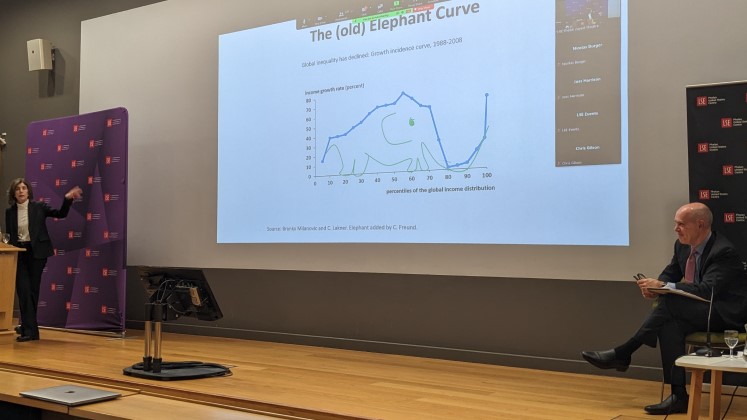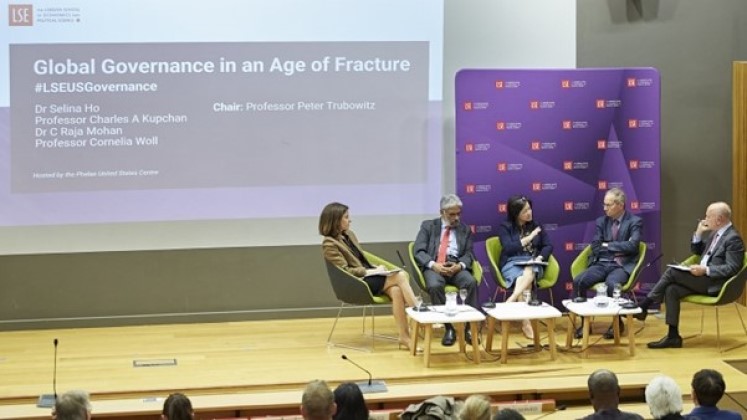 On Monday 27 March the Phelan US Centre hosted the in-person and online event ‘The Rise and Fall of the EAST’ with Yasheng Huang, the Epoch Foundation Professor of International Management at MIT. Hashim Ali gives an overview of the event and the Q&A segment.
On Monday 27 March the Phelan US Centre hosted the in-person and online event ‘The Rise and Fall of the EAST’ with Yasheng Huang, the Epoch Foundation Professor of International Management at MIT. Hashim Ali gives an overview of the event and the Q&A segment.
The West has held a complicated relationship with China, held by interdependencies for trade & economy, and often made difficult by their competitiveness for economic power. But is China’s autocratic strategy for competitiveness with the West hampering its technological development? At the event The Rise and Fall of the EAST, held on 27 March and hosted by the Phelan US Centre, Yasheng Huang, Epoch Foundation Professor of International Management at MIT argued that freedom is critical to innovative thought and the history of China’s inventions and economy could answer this question.
Unravelling analyses from his forthcoming book, The Rise and Fall of the EAST, Huang opened the event by highlighting the awe-inspiring superiority of Chinese technological development against Western technology as early as the 13th century, and then showcasing its stagnation to a collapse by the 19th century.
Huang argued that technological development relies on both ‘scale’ and ‘scope’. He described ‘scale’ as financial & human capital commitments, whilst explaining that ‘scope’ was the creative autonomy of ideas and actions for inventors. He showed through a series of graphs how the ‘scope’ collapsed in China, leading to the disappearance of political and ideological freedom in China as early as the Song Dynasty (960-1279), when Confucianism gained dominance and both Buddhism & Daoism declined.
The CHID (Chinese Historical Inventions Dataset) was the pioneering source of data Huang relied on for his observations. He explained how it is the largest database on Chinese technological inventions in the world and stems from an international collaboration from researchers among both MIT and Tsinghua University.
Showcasing a series of graphs built on the CHID, Huang mapped the historical decline of political diversity in China to be almost parallel to the decline of technological development in China. This also showed that larger empires were less inventive, and how Buddhism and Daoism collapsed during the second and third eras of technology in China, respectively.
Moving on into the second half of the event, Huang presented analyses on the modern-day model of China. He explained how the Chinese Communist Party (CCP) is very invested in ‘scale’, yet ‘scope’ is forgotten by way of an antagonistic relationship with the West and a crackdown on political dissent in China. He supported his argument, concluding that contemporary China is currently at its most autocratic moment in history, with CHID data showing low internet freedom scores in the country.
Professor Huang explained how a relationship with the West is critical to China’s success by explaining that telecoms firm, Huawei attained success due to its international collaboration, using its Operating System developed by US-led Google and its advanced camera lens developed by German-led Zeiss. He concluded by stating that China needs to invest in an American R&D project, and the West needs to overcome its naiveté of laissez-faire economics.
The Phelan US Centre’s Director, Professor Trubowitz, kicked off the Q&A section of the event by asking what the potential implications could be for the US should they imitate China’s high interactions in ‘scale’. Huang responded by that a collaborative synergy between China and the West would be the optimal ideal, as they complement each other’s strengths and weaknesses, but to imitate China would be a waste of expenditure.
A think tank researcher wanted to question the current Chinese government’s investment in aerospace technology, Huang explained that the orientation of investing in military technology could distract from the technological development of civilian technology like drug discoveries.
A student at the LSE asked whether the diminishing ‘scope’ in China caused its communist tendencies in the 20th century. Huang agreeably explained how China merely adopted Western Communism among the number of different ideologies available, due to it being reminiscent of Confucianism.
Listen to a Ballpark podcast interview with Professor Yasheng Huang on Spotify
- Please read our comments policy before commenting.
- Note: This article gives the views of the author, and not the position of USAPP – American Politics and Policy, nor the London School of Economics.
- Shortened URL for this post: https://bit.ly/43bwpsq







A riveting read. Is there a specific date for the book release? Will LSE be doing a reading of it?
Great coverage by my philosophy tutor 👏
It is precedented that the Eastern countries attempt to adopt and compete with Western countries after seeing them flourish economically. So they diminish in an innovative sense if they prioritise financial gain, just like how we see that there are less advancements in the biomedical field from China.
great read, will prof. be coming back soon?